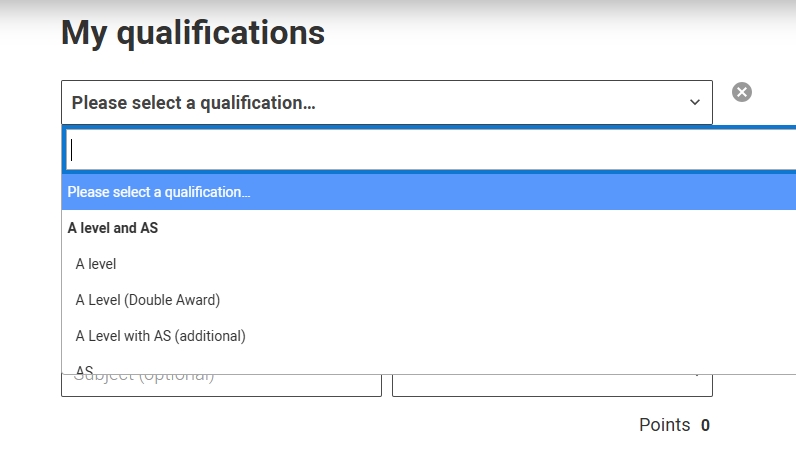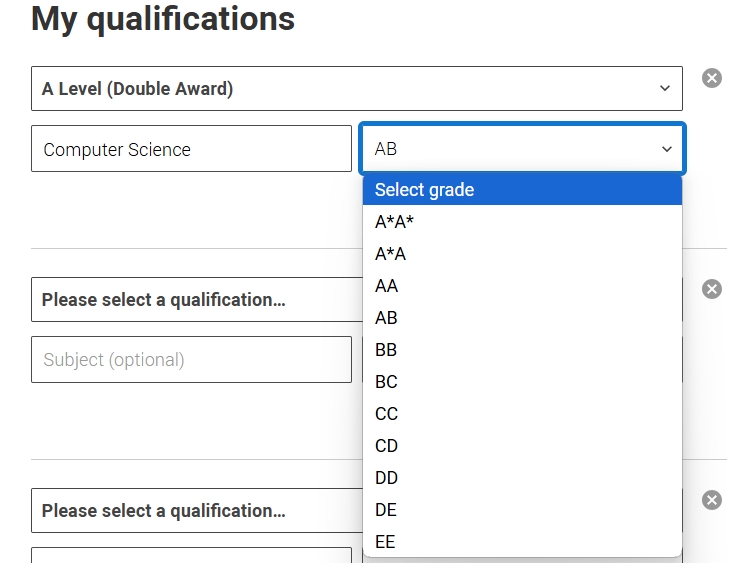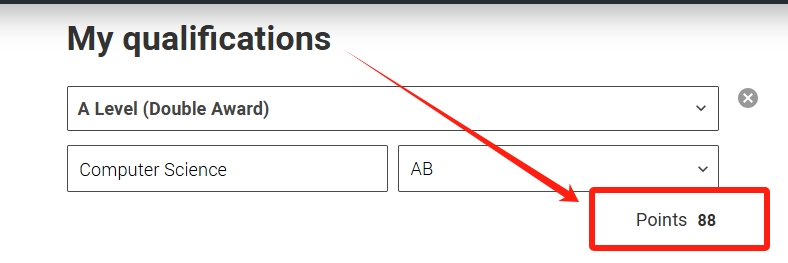When researching UK universities and potential courses, you’ll likely encounter the term ‘UCAS points’. If you’re new to the application process or don’t know anyone who has applied recently, this term might be new to you. However, understanding UCAS points is essential for navigating university entry requirements and ensuring you meet your chosen course’s criteria.
This guide will break down everything you need to know about UCAS tariff points, their significance in university admissions, and how to calculate and use them effectively for your academic goals.
What are UCAS Points?
UCAS Points, or UCAS Tariff Points, are used by the UK’s Universities and Colleges Admissions Service (UCAS) to assess the value of post-16 qualifications. Essentially, the UCAS tariff converts various qualifications into numerical points that determine eligibility for a course.
Not all qualifications have a UCAS tariff value, but those that do, vary in points based on the qualification’s size and the grade obtained. Higher grades result in more UCAS points, increasing a student’s chances of meeting course entry requirements.
Why Do Universities Utilize the UCAS Points?
UCAS points help universities fairly evaluate applicants by converting different qualifications and grades into a standard numerical score. This system allows universities to compare students from various educational backgrounds and make admissions decisions based on a consistent benchmark. It also offers students flexibility, as they can combine various qualifications to meet the required points for a course.
How to Get UCAS Points
To earn UCAS points, achieve specific grades in qualifications like A-Levels, BTECs, or the IB. Each grade is assigned a set number of points—e.g., an A* at A-Level equals 56 points. Combine your points to calculate your total UCAS points, which universities use to assess your eligibility. You can also use the UCAS points calculator to easily determine how your grades convert into points.
How to Calculate UCAS Tariff Points
Each qualification, like A-levels or Scottish Highers, is given a size band value between 1 and 4, based on the number of learning hours involved. On top of that, each qualification has a grade band point value between 3 and 14.
To calculate UCAS tariff points for a qualification, simply multiply the size band value by the grade band point value:
Size x Grade = Tariff Points.
If you find it confusing to add up the points individually, you can refer to the UCAS points chart below for a simpler solution.
UCAS Points for A Levels Grades
A-Levels (Advanced Level qualifications) are subject-based qualifications in the UK designed for students aged 16 and older, typically completed over two years. These qualifications are widely recognized for admission to higher education institutions in the UK and around the world. Most universities require applicants to have completed at least three A-Level subjects. A-Level grades are awarded on a scale from A* (the highest) to E, indicating varying levels of achievement.
| Grade | A Levels | AS Levels |
|---|---|---|
| A* | 56 | – |
| A | 48 | 20 |
| B | 40 | 16 |
| C | 32 | 12 |
| D | 24 | 10 |
| E | 16 | 6 |
UCAS Tariff Points for Scottish Highers
The Scottish Higher qualification is comparable to A-Levels in England, Wales, and Northern Ireland. On average, students typically complete two or three Advanced Highers.
| Grade | Scottish Highers | Scottish Advanced Higher |
|---|---|---|
| A | 33 | 56 |
| B | 27 | 48 |
| C | 21 | 40 |
| D | 15 | 32 |
UCAS Tariff Points BTEC Nationals
BTEC Nationals are vocational qualifications at Level 3 in the UK, designed to offer specialized, work-related education in various sectors. The grades you can achieve are as follows: Distinction (D), Merit (M), and Pass (P).
| National Extended Certificate | National Diploma | National Extended Diploma | |||
|---|---|---|---|---|---|
| Grade | UC Points | Grade | UC Points | Grade | UC Points |
| D* | 56 | D*D* | 112 | D*D*D* | 168 |
| D | 48 | D*D | 104 | D*D*D | 160 |
| M | 32 | DD | 96 | D*DD | 152 |
| P | 16 | DM | 80 | DDD | 144 |
| MM | 64 | DDM | 128 | ||
| MP | 48 | DMM | 112 | ||
| PP | 32 | MMM | 96 | ||
| MMP | 80 | ||||
| MPP | 64 | ||||
| PPP | 48 | ||||
UCAS Tariff Points Welsh Baccalaureate
The Welsh Baccalaureate was introduced to equip students aged 14 to 19 with skills for employment, further study, and life. To earn the Welsh Bacc, students complete the Skills Challenge Certificate. The Skills Challenge Certificate is a unique skills-focused qualification, alongside a specified set of additional qualifications.
| Grade | UCAS Points |
|---|---|
| A* | 56 |
| A | 48 |
| B | 40 |
| C | 32 |
| D | 24 |
| E | 16 |
UCAS Tariff Points T-Levels
T-Levels are new two-year courses taken after GCSEs and are roughly equivalent in size to three A-levels. They provide students with both classroom learning at a school or college and hands-on experience through an industry placement lasting at least 315 hours, or about 45 days.
| Overall Grade | |
|---|---|
| Distinction* | 168 |
| Distinction | 144 |
| Merit | 120 |
| Pass (C or above) | 96 |
| Pass (D or E) | 72 |
UCAS Tariff Points International Baccalaureate (IB)
The International Baccalaureate (IB) is an academic program considered as a strong alternative to A-levels. Offered in 143 countries worldwide, it provides two levels of study for students aged 16 to 19.
| Higher Level | Standard Level | Extended Essay | Theory of Knowledge | ||||
|---|---|---|---|---|---|---|---|
| Grade | UC Points | Grade | UC Points | Grade | UC Points | Grade | UC Points |
| H7 | 56 | S7 | 28 | A | 12 | A | 12 |
| H6 | 48 | S6 | 24 | B | 10 | B | 10 |
| H5 | 32 | S5 | 16 | C | 8 | C | 8 |
| H4 | 24 | S4 | 12 | D | 6 | D | 6 |
| H3 | 12 | S3 | 6 | E | 4 | E | 4 |
UCAS Tariff Points EPQ
The Extended Project Qualification (EPQ) is a Level 3 course that students can take alongside their A-levels. It involves completing a project on a topic of their choice, which may take the form of an essay, report, or physical artifact.
| Grade | UCAS Points |
|---|---|
| A* | 28 |
| A | 24 |
| B | 20 |
| C | 16 |
| D | 12 |
| E | 8 |
Can You Earn UCAS Points from GCSEs?
GCSEs cannot be converted into UCAS points, but they play a vital role in the admissions process. Your GCSE results determine eligibility for Level 3 qualifications, such as A-Levels and IB, and many sixth-form colleges have specific GCSE grade requirements. Moreover, while GCSEs don’t directly contribute to UCAS points, some universities may still consider them when evaluating applicants for admission.
The Importance of UCAS Tariff Points in University Admissions
With a grasp on calculating UCAS tariff points, the next step is to understand their role in university admissions. Knowing why these points matter can help you better prepare for your application and target the requirements of your chosen programs. Let’s dive into the importance of UCAS points and how they influence admissions decisions across universities.
UCAS points important in university admission for several reasons:
- Variety in Qualifications
UCAS tariff points offer students the ability to accumulate points from a wide range of qualifications. Points can be earned through A-levels, BTECs, the International Baccalaureate, and more. This system is beneficial as it enables students from diverse educational backgrounds to qualify for higher education without being restricted to a specific type of certificate.
- Inspiration and Goal-Setting
The UCAS tariff points system is intended to motivate students to strive for higher grades and attain additional qualifications. This can lead to more rewarding educational opportunities and better preparation for university-level study.
- Financial Aid and Scholarship Opportunities
Many scholarships and financial grants have specific UCAS Tariff Point requirements. Earning higher UCAS Points can enhance students’ eligibility for financial support, making higher education more attainable. In some instances, UCAS Points are the primary criterion for receiving financial aid, helping students secure the resources they need to achieve their academic goals.
- Comparative Evaluation
UCAS points serve as a standardised system for assessing the academic abilities of students across the UK. This uniformity allows universities and colleges to effectively compare candidates with diverse educational qualifications, helping them identify the strongest applicants for specific programs.
In summary, the UCAS system is essential to the UK’s educational framework, providing a flexible and comprehensive measure of student achievement that benefits both institutions and applicants.
Some universities require students to meet a specific number of UCAS points to be considered for admission. For example, they might offer a place only if the student achieves the required points from qualifications like A-levels, BTECs, or other similar courses. This helps ensure students meet both the academic and subject-specific requirements for their chosen course.
However, not all UK universities place the same emphasis on UCAS points. While they are important, many universities also consider other factors such as personal statements, references, and interviews. In certain fields like medicine, engineering, and science, universities may focus more on specific subject grades to ensure applicants have the necessary knowledge for the course.
Using the UCAS Tariff Calculator
Once you understand the importance of UCAS tariff points in the admissions process, the next step is to learn how to calculate your own points accurately. The UCAS tariff calculator / UCAS points converter is a valuable resource designed to streamline this process. In the following section, we’ll walk you through how to use this calculator to assess your qualifications and ensure you meet the entry requirements for your desired courses.
To use the UCAS calculator available on the official website, follow these steps:
Step 1: Begin by selecting the type of qualification from the list at the top of the UCAS calculator. After making your selection, enter the course title in the designated box.

Step 2: Choose the grade you received for the qualification. And click ‘Add this qualification’ to include it in your UCAS tariff points. This qualification will then be displayed at the top of the calculator. Repeat these steps to add any additional qualifications you have.

Step 3: The bottom right of the calculator will show your total UCAS tariff points. You can use this information to determine your eligibility for your chosen course.

Note: Tariff points are calculated based on the highest level of qualification attained. Therefore, AS and A2 scores for the same subject cannot be combined. This principle also applies to other qualifications, such as Scottish Highers and Advanced Highers.
Conclusion
In conclusion, understanding UCAS points is essential for navigating the university application process in the UK. They offer a way for universities to fairly compare applicants from different backgrounds. Furthermore, by knowing the answer to “how to calculate my UCAS points” and understanding their role in admissions, you’ll be more ready to approach your university applications confidently.
As you prepare for your university journey, finding the right accommodation is just as important. Websites like uhomes.com offer a variety of housing options near UK universities, helping you find the perfect place to live and making the search smooth and stress-free.
FAQs about UCAS Points
How hard is it to get 120 UCAS points?
There are several ways to achieve 120 UCAS Tariff points. Some of the most common methods include:
- Three A-levels with grades of BBB or A*CC.
- Two A-levels and two AS-levels with grades of BB plus aa, or AB plus bb.
Can I go to college without UCAS points?
In some cases, it is possible to apply to a university without any UCAS points, as the decision to use the UCAS points system is entirely at the discretion of each individual university. However, most universities do utilise the UCAS points system.
Which universities in the UK don't need UCAS?
Some students may choose to apply directly to a university instead of using the UCAS process. Several UK universities that accept direct applications include:
What's the average number of UCAS points?
The average course requirements for admission range from 95 to 208 UCAS points. These values, however, are averages, and the actual UCAS points required for a specific course may differ greatly.







